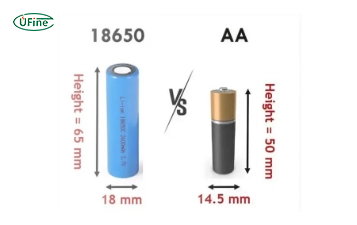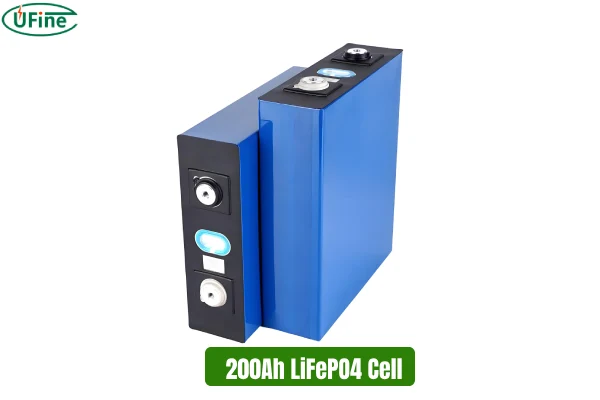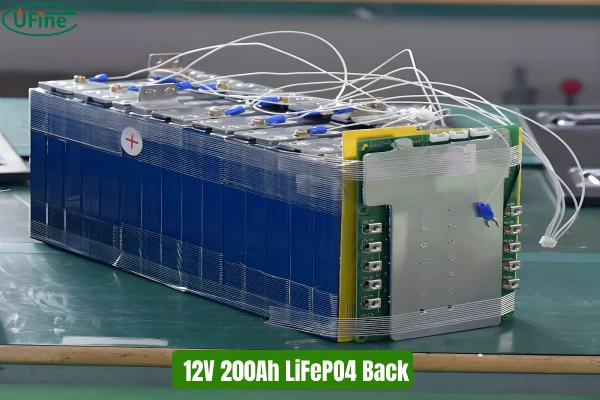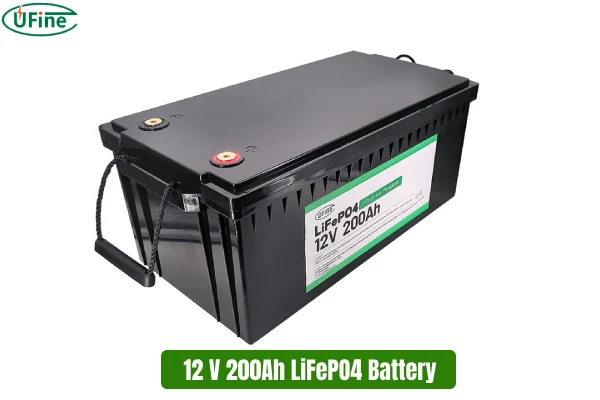
- Part 1. 200Ah lithium ion battery overview
- Part 2. Understanding 200Ah lithium ion battery types
- Part 3. Key parameters
- Part 4. 12V 200Ah lithium ion batteries
- Part 5. 200Ah lithium ion battery prices
- Part 6. How to choose the right 200Ah lithium ion battery?
- Part 7. Charging and maintenance
- Part 8. 200Ah lithium ion battery manufacturers
- Part 9. Conclusion
In a world increasingly reliant on portable power, choosing the right battery is crucial. For applications demanding high capacity and long-lasting performance, 200Ah lithium ion batteries stand out as a powerful solution. But with a variety of options available, selecting the ideal battery for your specific needs can be a challenge. This comprehensive guide will delve into the intricacies of 200Ah lithium ion batteries, equipping you with the knowledge to make an informed decision.
Part 1. 200Ah lithium ion battery overview
A 200Ah lithium ion battery is a powerhouse, offering a significant energy storage capacity. This translates to longer run times for your devices and greater flexibility in powering various applications. The high energy density of these batteries also means they are compact and lightweight, making them ideal for portable and space-constrained systems.
Part 2. Understanding 200Ah lithium ion battery types
Not all 200Ah lithium ion batteries are created equal. Different chemistries offer unique advantages and drawbacks, influencing their performance, lifespan, and cost. Here’s a closer look at the most common types:
1. Lithium Iron Phosphate (LiFePO4): The Champion of Safety and Longevity
- Key Features: LiFePO4 batteries are renowned for their exceptional safety and longevity. They are less prone to overheating and have a longer cycle life compared to other lithium-ion chemistries. This makes them ideal for applications where safety and reliability are paramount, such as solar energy storage and electric vehicles.
- Pros:
- High safety
- Long cycle life (typically exceeding 2,000 cycles)
- Excellent thermal stability
- Environmentally friendly (no heavy metals)
- Cons:
- Slightly lower energy density compared to other chemistries
- Can be more expensive than some alternatives
2. Lithium Nickel Manganese Cobalt Oxide (NMC): Balancing Power and Stability
- Key Features: NMC batteries offer a well-rounded combination of high power output and good stability. They are often favored for applications requiring a balance between performance and longevity, such as electric bicycles and power tools.
- Pros:
- High energy density
- Good power output
- Relatively long cycle life
- Cons:
- Slightly lower safety compared to LiFePO4
- Can be more susceptible to degradation at high temperatures
3. Lithium Cobalt Oxide (LCO): A Popular Choice for Electronics
- Key Features: LCO batteries are commonly found in consumer electronics due to their high energy density and relatively low cost. They offer good performance for devices like smartphones and laptops, but their lifespan and safety are not as impressive as LiFePO4 or NMC.
- Pros:
- High energy density
- Relatively low cost
- Cons:
- Shorter cycle life compared to LiFePO4 and NMC
- Lower thermal stability
- Can be susceptible to overheating
Part 3. Key parameters
To choose the right 200Ah lithium ion battery, you need to understand its key parameters:
1. Capacity: The Heart of Energy Storage
- What it means: Capacity, measured in amp-hours (Ah), indicates the amount of electrical energy a battery can store. A 200Ah battery can theoretically provide 200 amps of current for one hour, or 100 amps for two hours, and so on.
- Why it matters: Higher capacity translates to longer run times for your devices and the ability to power more demanding applications.
2. Voltage: The Driving Force
- What it means: Voltage determines the electrical potential of the battery. A 12V battery has a higher voltage than a 6V battery, meaning it can deliver more power.
- Why it matters: Voltage compatibility is crucial. Ensure the battery’s voltage matches the requirements of your device to prevent damage.
3. Cycle Life: The Measure of Longevity
- What it means: Cycle life refers to the number of times a battery can be fully charged and discharged before its capacity significantly drops.
- Why it matters: A higher cycle life indicates a longer lifespan, making the battery a more valuable investment.
4. Temperature Range: Operating Within Limits
- What it means: Temperature range specifies the operating temperatures at which the battery performs optimally.
- Why it matters: Exceeding the temperature range can negatively impact battery performance and lifespan.
Part 4. 12V 200Ah lithium ion batteries
While 200Ah lithium ion batteries come in various voltages, the 12V variant is particularly popular due to its versatility. Here’s a breakdown of its common applications:
1. Solar Energy Storage: Harnessing the Sun’s Power
- How it works: 12V 200Ah lithium ion batteries are ideal for storing solar energy generated by photovoltaic panels. They provide a reliable power source for homes, businesses, and off-grid systems.
- Key Advantages:
- Long lifespan
- High capacity for storing energy
- Safe and reliable operation
2. RV and Marine Use: Power on the Go
- How it works: 12V 200Ah lithium ion batteries power essential appliances and systems in recreational vehicles (RVs) and boats. They provide reliable power for lighting, refrigerators, water pumps, and other amenities.
- Key Advantages:
- Compact size and lightweight design
- High capacity for extended off-grid use
- Efficient charging capabilities
3. Backup Power: Ensuring Continuity During Outages
- How it works: 12V 200Ah lithium ion batteries can serve as a backup power source during power outages. They can power essential devices like refrigerators, computers, and medical equipment, ensuring critical functions remain operational.
- Key Advantages:
- Reliable power supply during emergencies
- Long runtime for extended outages
- Safe and stable operation
Part 5. 200Ah lithium ion battery prices
The price of a 200Ah lithium ion battery can vary significantly depending on the type, brand, and features. Here’s a general price range to consider:
- Basic Models: $500 – $800
- Premium Models: $800 – $1,200
Keep in mind that higher-quality batteries with longer cycle lives and advanced features will typically command a higher price.
Part 6. How to choose the right 200Ah lithium ion battery?
Choosing the right 200Ah lithium ion battery involves considering your specific needs, budget, and priorities. Here’s a step-by-step guide to help you make an informed decision:
1. Define Your Application Needs: What Will It Power?
- Identify your primary application: Will it be used for solar energy storage, powering an RV, or providing backup power?
- Determine your power requirements: What devices will it need to power, and for how long?
- Consider environmental factors: Will the battery be exposed to extreme temperatures or harsh conditions?
2. Set Your Budget: Balancing Cost and Value
- Establish a realistic budget: Consider the price range of different battery types and brands.
- Factor in long-term costs: A higher-quality battery with a longer cycle life may be a better investment in the long run.
3. Research Brand Reputation: Trust Matters
- Explore reputable manufacturers: Look for brands known for quality, reliability, and customer support.
- Read reviews and testimonials: Gain insights into the real-world performance and durability of different batteries.
4. Consider Key Parameters: Matching Specs to Needs
- Capacity: Choose a battery with sufficient capacity to meet your power requirements.
- Voltage: Ensure the battery’s voltage matches your device’s specifications.
- Cycle Life: Opt for a battery with a high cycle life for longer lifespan and better value.
- Temperature Range: Select a battery that can operate within your expected temperature range.
5. Don’t Forget the Charger: A Vital Companion
- Compatibility: Ensure the charger is compatible with your battery’s specifications.
- Features: Look for features like overcharge protection, smart charging, and rapid charging capabilities.
Part 7. Charging and maintenance
Proper charging and maintenance are crucial for extending the lifespan of your 200Ah lithium ion battery. Here are some essential tips:
1. Regular Charging: Avoid Deep Discharges
- Regularly charge the battery: Avoid letting the battery discharge completely, as this can shorten its lifespan.
- Follow the manufacturer’s charging recommendations: Use the recommended charger and charging methods.
2. Storage: Keep it Cool and Dry
- Store in a cool, dry place: High temperatures and humidity can degrade the battery.
- Avoid direct sunlight: Sunlight can also negatively impact battery performance.
3. Inspection: Catch Problems Early
- Regularly inspect the battery: Check for any signs of damage, leaks, or corrosion.
- Address any issues promptly: Contact the manufacturer or a qualified technician if you notice any problems.
Part 8. 200Ah lithium ion battery manufacturers
Several reputable manufacturers specialize in 200Ah lithium ion batteries. Here’s a highlight of one leading provider:
Ufine Battery: A Trusted Name in Lithium Battery Solutions
- Customization: Ufine Battery offers a wide range of customizable lithium battery solutions, including 200Ah models, to meet diverse needs.
- Quality: They are known for their commitment to quality and reliability, ensuring their products meet rigorous standards.
- Expertise: With years of experience in the lithium battery industry, Ufine provides valuable insights and support for selecting the right battery.
Part 9. Conclusion
Choosing the right 200Ah lithium ion battery is a significant investment, impacting your device’s performance, longevity, and overall experience. By understanding the various types, key parameters, and essential considerations outlined in this guide, you can confidently navigate the world of 200Ah lithium ion batteries and make an informed choice that meets your specific needs. Remember, a well-chosen battery is not just a power source but a reliable partner for your endeavors.
Related Tags:
More Articles

18650 Battery vs AA: Which Is Better for Your Device?
Compare 18650 vs AA batteries in capacity, voltage, rechargeability, and applications. Learn which battery type fits high-drain or everyday devices.
What is the Difference Between Battery Cell, Battery Control Module, and Battery Pack?
Compare battery cells, modules, and packs. Learn functions, design differences, control modules, and selection tips for EV, ESS, and industrial use.
How to Prevent LiPo Battery Explosion?
Can LiPo batteries explode or catch fire? Learn key causes of LiPo battery fires and proven charging, storage, and handling tips to reduce explosion risk.
Aluminium Ion Battery vs Lithium-Ion: A Detailed Comparison
Compare aluminium ion battery vs lithium-ion battery in energy density, charging speed, safety, cost, and uses. A practical guide for engineers and buyers.
C vs D vs AA Battery: Size, Voltage, Capacity & Key Differences Explained
Compare AA, C, and D batteries by size, voltage, capacity, and lifespan. Learn the real difference between C and D batteries and which one you should use.





